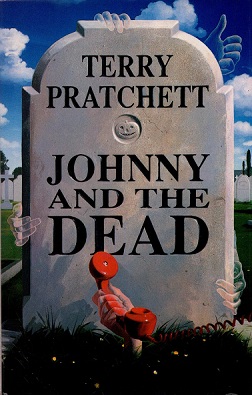Johnny and the Dead facts for kids

First edition
|
|
| Author | Terry Pratchett |
|---|---|
| Cover artist | John Avon |
| Country | United Kingdom |
| Language | English |
| Series | Johnny Maxwell Trilogy |
| Genre | Children's literature, Fantasy |
| Publisher | Doubleday (London) |
|
Publication date
|
1993 |
| Media type | book |
| ISBN | 0-385-40301-1 |
| OCLC | 28889741 |
| Preceded by | Only You Can Save Mankind (1992) |
| Followed by | Johnny and the Bomb (1996) |
Johnny and the Dead is an exciting fantasy novel written by the famous author Terry Pratchett. It was published in 1993. This book is the second part of the Johnny Maxwell Trilogy, a series about a young boy named Johnny. The other books in the series are Only You Can Save Mankind (1992) and Johnny and the Bomb (1996).
In Johnny and the Dead, Johnny discovers he can see and talk to the spirits of people buried in his local cemetery. These spirits don't like being called "ghosts"! Johnny must help them when their peaceful home is in danger. This book is even studied in some schools as part of their English lessons.
Contents
What Happens in the Story?
Johnny Meets the Dead
The story begins with Johnny Maxwell, a twelve-year-old boy. He takes a shortcut through the Blackbury cemetery on his way home. There, Johnny meets the spirit of Alderman Thomas Bowler. This is when Johnny realizes he can actually talk to people who have passed away.
A Threat to Their Home
Soon, Johnny meets all the other spirits living in the cemetery. They are very worried because the local council plans to sell their neglected cemetery. A big company wants to buy the land to build new offices. The spirits, led by a former town councillor, ask Johnny for his help to stop this plan.
Working Together
Johnny, with some help from his friends who aren't quite sure what to believe, tries to find proof of famous people buried in the cemetery. He hopes this will make the council change its mind. Johnny also speaks up at community meetings to share the spirits' concerns.
New Journeys for the Dead
While Johnny is busy, the spirits start to learn about modern life. They realize they are not stuck in the cemetery forever, as they once thought. In the end, the council is forced to give up their building plans. But the spirits are no longer interested in staying. They decide to move on to the afterlife themselves. As one spirit says before leaving, "The living must remember, and the dead must forget." Thanks to Johnny and the Blackbury Volunteers, the living residents of the town also rediscover the cemetery. They now see it as an important link to their town's past.
Main Ideas and Themes
Inspired by Real Events
The story of Johnny and the Dead was partly inspired by real events. In the 1980s, when Terry Pratchett was working as a journalist, a council in Westminster actually sold three cemeteries for a very small amount of money. This real-life event gave Pratchett the idea for the book.
Historical Connections
Part of the story also features the last living member of the Blackbury pals. This was a special group of soldiers, much like the famous Accrington Pals. The character is named Tommy Atkins, which was a common nickname for British soldiers back then.
"Nearly Famous" Spirits
A funny part of the book is that most of the spirits are "nearly famous." They are often very similar to well-known British people. For example, one important spirit, William Stickers, is described as "The man who would have invented communism if Karl Marx hadn't." It's possible that Pratchett imagined Blackbury Cemetery to be a bit like the famous Highgate Cemetery in London.
Other Versions of the Story
TV Show Adaptation
Johnny and the Dead was turned into a TV show for Children's ITV on ITV in 1995. Andrew Falvey played Johnny in the show. Famous actors like Brian Blessed played William Stickers, and George Baker played Alderman Bowler.
Stage Play Adaptation
The book was also adapted into a play by Stephen Briggs. This means you could watch the story performed live on a stage!
Around the World
Johnny and the Dead has been translated into many different languages so that children all over the world can read it. Here are some of the translations:

